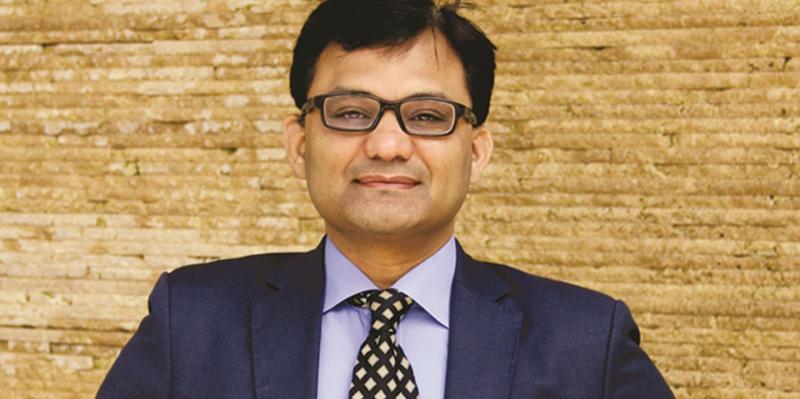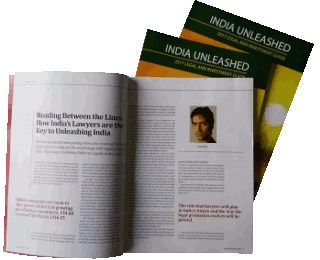
I would like to congratulate Legally India for having established itself as a progressive, galvanizing force for the Indian legal fraternity, against many odds. This publication represents an incremental step in Legally India’s journey and a timely reminder of India’s economic potential. These days, I am more confident (but not complacent) that India will not simply fritter away its demographic dividend as the narrative shifts from that of a tiger caged to a tiger on the tail of a dragon.
It is clear to seasoned observers – both looking in from out and looking out from within - that India has embarked on a journey that will lead to profound economic and political changes. The creative energies being unleashed and capitalized by the annuity of a unique demographic dividend over the next 30 years or so, are likely to make India a magnet for in-bound and out-bound trade and investment flows that will generate enormous opportunities.
All around us there is profound change going on: the impending introduction of a revolutionary goods and services tax (GST) has required constitutional changes at the federal level and a huge understanding and compromise on the part of all stakeholders propelled by a vision to create a single market across India for the first time; a quantum leap in financial inclusion is taking place through applications collectively known as the ‘India Stack’, anchored by the Aadhaar citizen identification number scheme; the goal is set to reduce use of fossil fuels and increase capacity of renewables through the national solar mission, which dramatically upgraded solar power generation target from 22 gigawatts (GW) to 100 GW by 2022; or India’s space programme that marries the pursuit of science and technological advancement with economic and commercial benefits to the whole country, underpinned by age-old frugalism, which has culminated in India’s Mars mission and a more recent launch of 100+ satellites from a single rocket.
The list of forces shaping the new India goes on and on.
In this context, it is apt to think about how the legal fraternity can harness the progressive forces to facilitate its own transformation. I believe that we should be willing to adopt a blue sky approach to how we want to position the legal profession, so that it is progressive, well organised, well run, visionary, strategic and selfless. I am confident that everyone sees the need for urgent reforms to modernise the legal profession which seems to be trapped in an outdated regulatory bind that is resistant to change. Only then can we hope to attract, train and retain top talent in the legal profession, which should count in-house lawyers as its own. It’s not rocket science.
The largest law firms of the pre-1991 era have pretty much given way to a new breed of law firms that were established from scratch or grew substantially in the last 20 years. Even as late as 10 years ago, as India was incrementally opening up to the world, it was tough for someone like me on the buy side of legal services to be assured of quality consistency based on a law firm brand.
It was always a case of horses for courses when it came to choosing a lawyer. You were always choosing a lawyer, not a particular law firm. I have spent more time than I should have had to do in hand-holding or shaping the output of a work product that might be issued on the letterhead of a law firm but for which I am also accountable internally.
More than a decade ago, the legal profession had already started to attract the brightest talent in India but one of the problems was that the fast growing Indian law firm just did not have the organizational wherewithal to train its talent.
Fortunately, that problem is less acute due to a fair amount of talent that has gone abroad to work and returned to practice and share what they have figured out, whether in terms of drafting, producing business user friendly advice or acquiring soft skills to manage a client relationship. Also, there is clearly a lot more focus on professional development in larger law firms.
Over the last decade, at the top end of the spectrum, I have witnessed an emergence of lawyers that are well-rounded business advisors: in this respect too, placement of lawyers from private practice to in-house on temporary assignments has helped, as those lawyers return with a much clearer understanding of legal risk management and other client drivers.
While I am happy to report this improvement, I must also caution that any Indian law firm that takes its eyes off grooming its talent will do so at its own peril in a highly competitive marketplace, even if not all buyers of legal services are as discerning and demanding in terms of quality. Talent development and retention needs to be at the core of a law firm’s plans, and in this respect, among other things, we need to start attending to an agenda that is inclusive of our diverse talent and start to address issues such as gender balance at all levels of hierarchy, particularly at the senior levels, as well as in removing conscious and unconscious biases that people carry with them.
Equally, top class legal talent resides in-house and I have full faith that in-house lawyers will lead the discourse on the development of a robust corporate governance framework for risk and control and will be valued for their ability to exercise judgment holistically beyond their silos as they claim their rightful place at the corporate high table.
In terms of blue sky thinking for the legal profession, apart from the need to modernise itself, we also need to shape many other reforms: we need to reform the administration of justice to speed up delivery and to clear a crippling backlog of cases; we need to create an effective and working environment to make India a viable centre for alternative dispute resolution; we need to emerge as a service industry in its own right since the potential to provide legal services to the rest of the English-speaking world is immense, and this opportunity to create huge employment should not be sniggered at; and we need to play a constructive role in advocating for policy changes and coordinate better with the bureaucracy to avoid regulatory ambiguities that abound rulemaking in India.
Lawyers have played a huge role in facilitating India’s economic transformation post-1991; now that the winds of change are blowing in our direction, I am confident that we will no longer remain passive to change because it is time to envision India being uncorked and unleashed like never before.
This article is brought to you by India Unleashed

India Unleashed is a print and online publication by Global Legal Media and Legally India, providing country-by-country insights and sector-specific analysis from leading law firms and writers around the world.
threads most popular
thread most upvoted
comment newest
first oldest
first
threads most popular
thread most upvoted
comment newest
first oldest
first